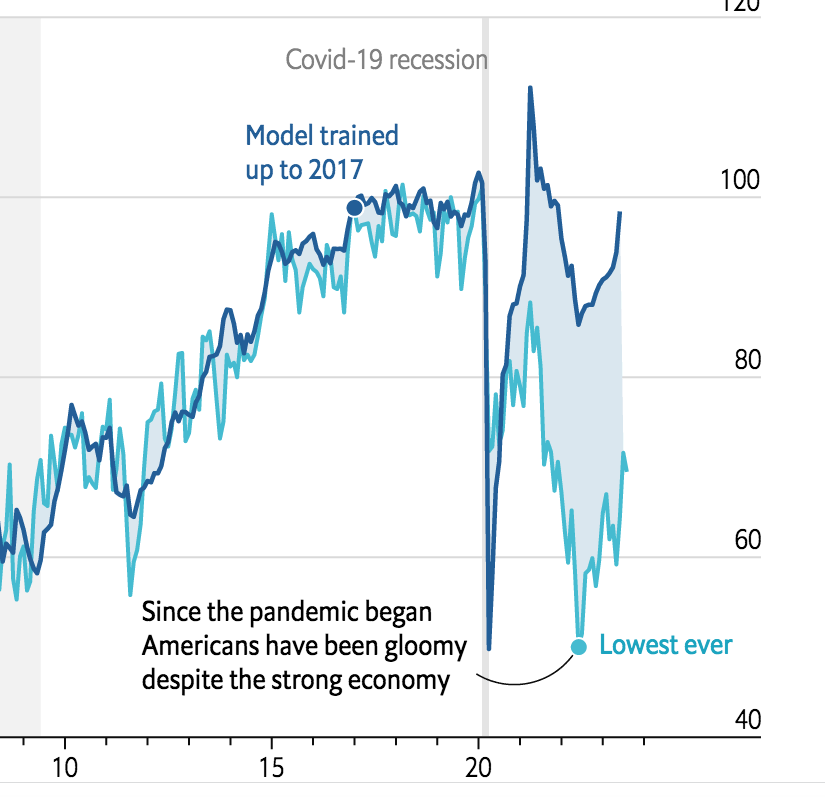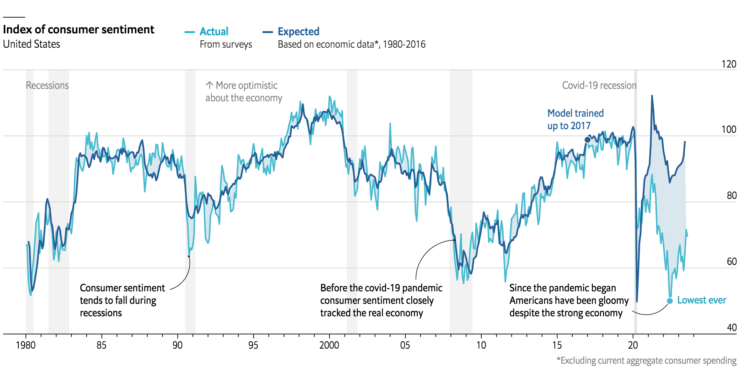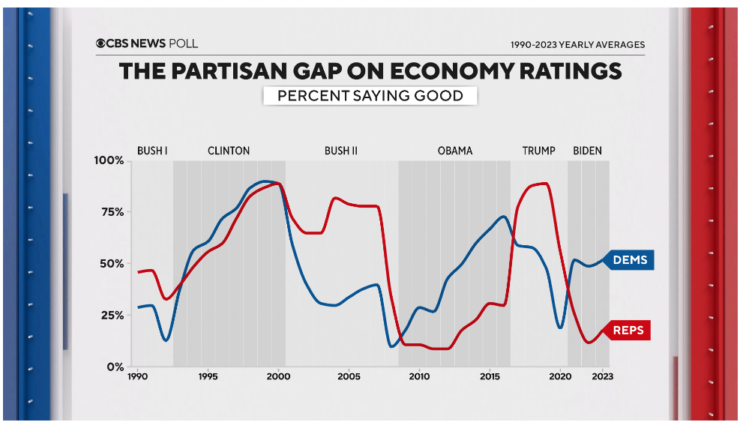
Over the past few years, consumer sentiment has increasingly run far below the level predicted by models based on economic data. The Economist illustrates the issue with a graph:

The Economist attributes the gloomy outlook to the lingering effects of Covid. I suspect the actual explanation is growing political polarization. Consider the growing partisan gap in how voters evaluate the economy:

Back in the 1990s, there wasn’t much partisan difference in how voters evaluated the condition of the economy. This was before the public had come to view people with different points of view as the enemy. I suspect that the responses to polls were more honest back then. After 9/11, opinion became more polarized. After Trump was elected, polarization increased even further. Today, voters in the two major parties live in completely separate worlds, consuming media that is tailored to fit their prejudices. Thus it’s not surprising that they have radically divergent views of the world.
Voters seem to rate the economy much more highly when their preferred candidate is in power, perhaps partly due to the mistaken assumption that presidents somehow control inflation and the business cycle. (A myth that is encouraged by our media.)
Until 2021, the biases of the two parties roughly offset, leaving the overall rating roughly equal to the rating one would expect based solely on the economic data. This changed after Joe Biden became president. Unlike with President Obama (who inherited a weak economy), Democratic voters are only lukewarm on the current president.
In contrast, Republican voters have an extremely negative view of President Biden. With only lukewarm sentiment from Democrats, there is nothing to offset the extremely low economic rating of Republicans. This leaves the overall rating for the economy far below the level you’d expect with rising real wages, 3.8% unemployment, and 3.7% inflation. At one point in 2022, consumer sentiment fell below the lowest reading of the early 1980s, when the economy was in far worse shape.
I don’t believe these consumer sentiment figures represent the actual views of the public. Consumer spending is still very strong, an indication that people feel pretty good about the economy. Actions speak louder than words. I suspect the low reported sentiment is mostly a reflection of GOP voters expressing anger at the current political situation.
My own view is that recent economic policy (since 2017) is quite bad, but the negative effects will show up in future years, at a point where we will need to confront the effects of an out of control federal budget. If people think the current economy is bad, wait until they see what’s coming down the road in a few years!
PS. Note to commenters: If you think the economic model is wrong, you need to explain why it fit the data for the 40-year period from 1980 to 2020.

READER COMMENTS
Andrew_FL
Sep 24 2023 at 7:34pm
“you need to explain why it fit the data for the 40-year period from 1980 to 2020.”
It’s literally fit to the data through 2017. There’s nothing to explain.
Physecon
Sep 24 2023 at 9:11pm
It’s generally easy to overfit a period and fail out of sample. In general I still think your point stands, though in the past 40 years have we really seen a period where NGDP has not only made up a large gap but then overshot trend by this much? These may just be different conditions to the rest of the time in that graph.
Scott Sumner
Sep 24 2023 at 10:38pm
Could be, but I suspect it’s politics.
Thomas Hutcheson
Sep 24 2023 at 10:13pm
The mistaken assumption that presidents somehow control inflation and the business cycle. (A myth that is encouraged by our media.)This is not taught in introductory Econ, so why do all the supposed econ pundits/politicians talk as if it were true? If they know that their fate in in the Fed’s hands, why risk claiming that the can do anything about inflation or employment? If they don’t know, why don’t they know?
Thomas Hutcheson
Sep 25 2023 at 1:55pm
Of course part of the reason is that the “other guys” claim it even if “we” know better. 🙂
BC
Sep 24 2023 at 11:22pm
Echo Physecon’s comment about the pre-2017 period being in sample. Also, the last period of high inflation, the 1970s, isn’t included in the graph. Maybe consumer sentiment is particularly negatively impacted, relative to the model, by inflation. Maybe the model only accurately predicts changes in consumer sentiment due to recessions but not inflation, especially if it is trained on data from 1980-2017.
Scott Sumner
Sep 25 2023 at 1:48am
That’s incorrect. Inflation was extremely high in 1980 and 1981 (more than 10%). In the late 1980s, inflation was higher than today. Something else is going on.
Jon Murphy
Sep 25 2023 at 7:33am
This is interesting. Like the others, I was originally thinking inflation too, but the numbers don’t back it up. The only way I can think of to make the inflation story work is if we consider recent trends in inflation. Inflation may be affecting consumer sentiment because it has been so low over the past 30 years or so. Thus, even though in absolute terms inflation remains relatively low, in relation to recent levels it is very high. So, many people (most of whom were not alive or very young in the 70s-80s) do not have a prior framework of high inflation and thus are pessimistic.
I do not know if this is the case; more data are needed. I am just stating that is the only way I could square the circle if inflation is the reason for the pessimism.
I do think rancorous politics is playing in. Both elements of the Left and Right are proclaiming the End of the American Economy and both act as if we are just one election away from losing everything. Both use this paranoia to justify increasingly illiberal and authoritarian violations of rule of law. There is a lot of fear out there, stoked by charlatans and wanna-be keyboard revolutionaries. How much elese elements affect general sentiment, I do not know.
Jon Murphy
Sep 25 2023 at 9:03am
I had another thought on my way in to work today:
One thing that might explain low economic sentiment despite relatively strong economic indicators is a decline in quality (there is a word my generation, the Millennials, use for this, but it would violate the comments policy).
One thing I have noticed since the Pandemic is a huge decline in quality of goods. Even brand names are suffering. Two examples, I love Quaker instant oatmeal. I’ve been eating it at least once a week my entire life. I stopped buying it a few months ago because they did something and it tastes like sawdust now. I’ve even stopped shopping at Amazon because they are selling such low quality goods that I am returning most of what I’ve bought because it is broken, defective, or just plain cheap.
So, a combination of relatively high prices and lower quality makes people feel like things are bad.
Scott Sumner
Sep 25 2023 at 11:25am
I’ve also noticed a recent drop in the quality of goods and services–mostly services.
Dylan
Sep 25 2023 at 11:32am
Interesting thoughts, Jon. I’ve not noticed that in physical products much (or at least nothing out of the ordinary of things seeming to have lasted a lot longer decades ago, which I admit is probably mostly survival bias observation). I have noticed this a lot more with software and services. First, everything moved to a subscription model, and then it seems that every update breaks a bunch of features I’ve used for a long time, and adds features that I don’t want (like ads on top of my subscription). And, then think of how a couple of generations have grown up with the expectation that everything on the internet is free, and over the last few years paywalls have led to an increased balkanization of the internet. I get why it has happened, but it is hard to claim that it hasn’t led to a worse experience of the internet compared to the one I grew up on that was a little more idealistic.
Quick thought on oatmeal though. I made a discovery only a year or so ago, that I like to buy the non-instant oatmeal, but cook it according to the instant oatmeal directions, so just a bit of water and 6o seconds in the microwave. I find this to be way superior to instant and am disappointed I didn’t discover this earlier. Also, buy oatmeal in bulk and add your own flavorings instead of getting the packets with it added. Only takes an extra 20 seconds of prep time and is both cheaper and more tasty.
Jon Murphy
Sep 25 2023 at 12:38pm
My dad recommended the same oatmeal technique you did. I think I will move in that direction
Jim Beaver
Sep 27 2023 at 12:18am
I don’t like oatmeal but find it reassuring that it’s a topic of discussion. At least some sort of problem is being solved instead of just the usual bickering.
Dylan
Sep 28 2023 at 9:32am
@Jon, glad that you’ve got a smart dad. Hope you try it and like it. My biggest trouble now is finding the non-instant oatmeal, since my grocery store runs out frequently.
@Jim Beaver – I also like it when people can be like “hey, I had that problem too, this is how I fixed it.” Plus, I loved you in Deadwood.
MarkW
Sep 25 2023 at 10:39am
I don’t believe these consumer sentiment figures represent the actual views of the public.
I can’t claim to have my finger on the pulse of the average consumer, but I have the sense that people have a feeling of living in some kind of economic ‘Indian Summer’, waiting for shoes to drop. Higher interest rates should have pushed housing prices down, but they’ve gone up because of very limited inventory due to people not wanting to move and give up low interest rates on their existing home. Similarly, commercial real-estate is in a state where lots of long-term leases haven’t yet expired even though the space is mostly empty. And my understanding is that real wages have been declining. I think people’s economic ‘sadness’ may be more about the expected future than the present.
Scott Sumner
Sep 25 2023 at 11:26am
“And my understanding is that real wages have been declining.”
That may be part of the problem—bad reporting.
MarkW
Sep 25 2023 at 12:27pm
If so, there seems to be rather a lot of it, from a variety of sources. This one, for example, includes a chart of BLS-sourced data showing two straight years of real-wage declines from April ’21 through April ’23.
Scott Sumner
Sep 25 2023 at 4:31pm
Real wages are higher than a year ago. That data series cannot explain such weak sentiment figures. (Last year was different.)
TMC
Sep 25 2023 at 2:56pm
Fred data has it down since the covid fueled high, though it has been slowly coming back .
https://fred.stlouisfed.org/series/LES1252881600Q
Inflation still feels like it’s high too. The YOY is running lower but we’re still considerably up from a couple years ago. Average this year is 4.5% Back in 2017 everyone felt good as the more plentiful working class had the big gains. Everything seemed to be going well. There was some bad policy like trade policy and the debt, but the debt just jumped 1.5T since May, so a lot worse. The homeless issues have got worse and some major cities have lost control of their streets. Feels like the worst part of the 1970s all over again. I’m using the word ‘feel’ a lot, but this is about sentiment.
Dylan
Sep 25 2023 at 11:51am
I wonder if there is a sector component to this where sectors that are doing relatively less good right now also tend to lean Democrat? In tech, I know tons and tons of people that have been laid off over the last year, and even the ones that have found new jobs feel really, really insecure in them. One of my co-workers got rehired by the same big company in a new role, but hasn’t had any real work to do in months. I’m hearing lots of similar stories throughout my network. Another woman I know that is a super champ at getting interviews and job offers, was laid off a couple of months ago and is majorly struggling this time.
There also seems to be a big sense of gloom among the creative classes and knowledge workers that AI is going to be a major disrupter for them, so like MarkW mentioned, there’s a feeling of waiting for the shoe to drop.
TMC
Sep 25 2023 at 3:12pm
Computer services’ unemployment rate is 2.1%, and outside of FAANG, or what other acronym you want to use, the industry is pretty conservative. Even in the highly regulated sectors I work in (Govt, Medical and Financial) that are Dem hotbeds, the tech people lean right. I’d put most as conservative, then just don’t like either party, then liberal. Two of the biggest Trumpers I worked with were Californians working for the federal government.
Scott Sumner
Sep 25 2023 at 4:29pm
Maybe. But tech layoffs seem much too small to significantly impact national poll numbers.
Alex Mazur
Sep 25 2023 at 8:20pm
The model quickly fails as soon as it encounters out of sample data, wouldn’t read into it too much.
Scott Sumner
Sep 25 2023 at 8:56pm
Yes, but why?
Anonymous
Sep 25 2023 at 9:09pm
What if you fit a curve through 2010, would it fail for 2010-2017? If so then there’s nothing to see. (It does seem to work ok for 2017-2020 though) What happens if you project the curve backwards? Does it fit historical data?
MarkLouis
Sep 26 2023 at 10:53am
I suspect this model underweights the change in real wages. The 2yr change in real hourly wage explains sentiment pretty well, including the current period. It also has intuitive appeal.
Yes, inflation was still high in the early 1980’s but real wages were starting to rise thus leading to good sentiment.
Scott Sumner
Sep 27 2023 at 7:47pm
No, real wages did not rise in 1980-81, they fell.
Comments are closed.